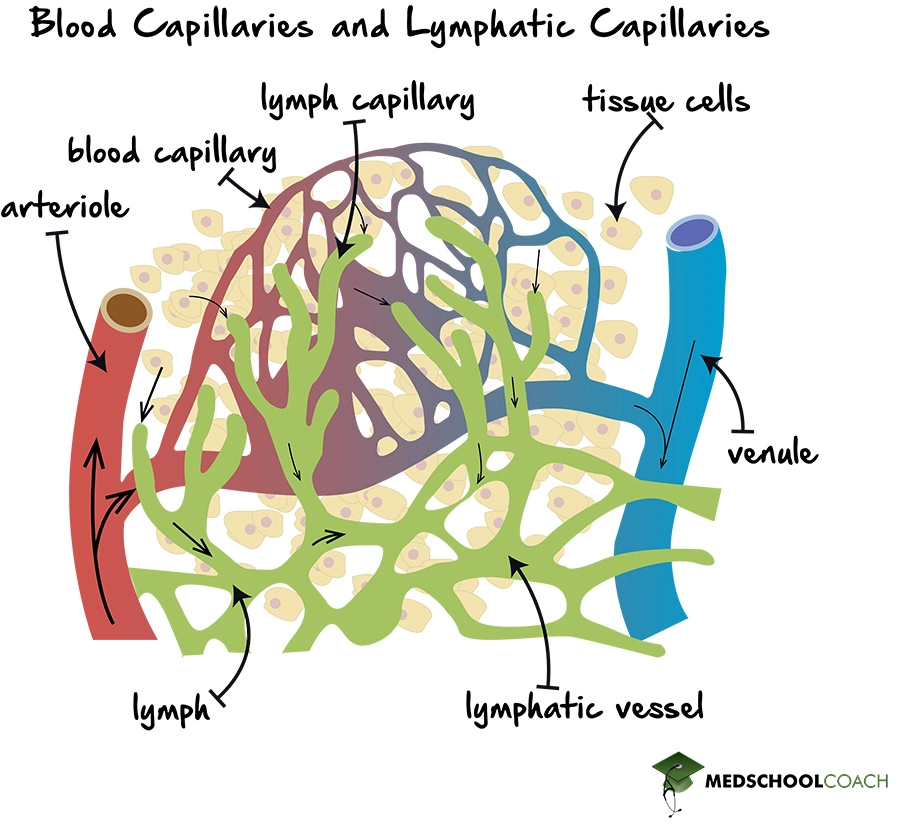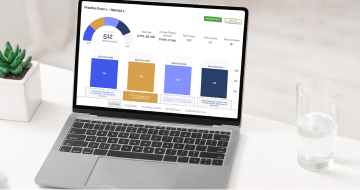The Lymphatic System
MCAT Biology - Chapter 7 - Section 5.1 - Organ Systems - Lymphatic System
- Home
- »
- MCAT Masterclass
- »
- Biological and Biochemical Foundations of Living Systems
- »
- Biology
- »
- The Lymphatic System – MCAT Biology
Sample MCAT Question - Lymphatic System
One of the primary functions of the lymphatic system is to:
a) filter blood and destroy toxins and waste.
b) absorb fat in the gastrointestinal tract.
c) assist in the digestion of carbohydrates.
d)maintain proper blood sugar levels in the body.
B is correct. The lymphatic system assists in the absorption of dietary fat.
The lymphatic system has different functions. One is to recover the excess fluid lost at the capillaries in the cardiovascular system. Once the fluid enters the lymphatic vessels, it is known as lymph. Lymph travels through lymph nodes and gets filtered of pathogens before it returns to veins in the circulatory system. The lymphatic system also consists of lacteals, which function to absorb fat in the gastrointestinal tract. The liver filters the blood and destroys toxins and waste (choice A is incorrect). Carbohydrate digestion occurs in the GI tract (choice C is incorrect). The pancreas secretes insulin and glucagon which help regulate blood sugar levels (choice D is incorrect).
Get 1-on-1 MCAT Tutoring From a Specialist
With MCAT tutoring from MedSchoolCoach, we are committed to help you prepare, excel, and optimize your ideal score on the MCAT exam.
For each student we work with, we learn about their learning style, content knowledge, and goals. We match them with the most suitable tutor and conduct online sessions that make them feel as if they are in the classroom. Each session is recorded, plus with access to whiteboard notes. We focus on high-yield topics if you’re pressed for time. If you have more time or high-score goals, we meticulously cover the entire MCAT syllabus.
What Is the Lymphatic System?
The lymphatic system is an integral part of both the circulatory and immune systems. It has a diverse array of functions, including the recovery of fluid lost during blood circulation, the filtering of pathogens, the absorption of dietary fat, and the production of certain immune cells. Figure 1 illustrates the different components of the lymphatic system. As you can see, the lymphatic system spans the entire body and includes several organs, including the spleen, the thymus, the bone marrow, and the lymph vessels and lymph nodes.

Functions of the Lymphatic System
Recall that in the cardiovascular system, there is a net loss of fluid from the capillaries. If not for the lymphatic system, this net loss of fluid would cause all of the tissues in the human body to swell. In this way, one of the primary functions of the lymphatic system is to recover excess fluid lost at the capillaries in the cardiovascular system. When fluid is taken up by the lymphatic vessels, it is called lymph rather than blood. Moreover, since this fluid is interstitial fluid, it may contain pathogens. Therefore, before this fluid is returned into circulation, it has to be filtered. Lymph nodes located all over the body are concentrated areas of lymphocytes that filter the lymph and clear it of any pathogens before it is returned into the blood supply. Lymph nodes are also important clinically because when they are enlarged, it is usually a sign of infection or inflammation. Also, depending on whether lymph nodes are painful or not, clinicians can determine what type of disease is present. A painless lymph node enlargement might point to cancer. In this way, lymph nodes are an integral part of the immune system.

Another function of the lymphatic system is to absorb fat in the gastrointestinal tract. The lymphatic vessels in the gastrointestinal system are called lacteals. Lacteals are mainly used for fat absorption.
The spleen, a major organ of the lymphatic system, has a role in clearing the body of damaged or old red blood cells. Moreover, it is a reserve for red blood cells, as well.
Other components of the lymphatic system are the thymus and bone marrow. The thymus is the location where T cells mature. T cells are an essential component of the adaptive immune system. The bone marrow, meanwhile, is where B cells and T cells are produced and where B cells mature. B cells are the complementary component of T cells in the adaptive immune system.
Explore More MCAT Masterclass Chapters
Take a closer look at our entire MCAT Masterclass or explore our Biochemistry lessons below.

One-on-One Tutoring
Are you ready to take your MCAT performance to a whole new level? Work with our 99th-percentile MCAT tutors to boost your score by 12 points or more!
See if MCAT Tutoring can help me
Talk to our enrollment team about MCAT Tutoring

MCAT Go Audio Course
Engaging audio learning to take your MCAT learning on the go, any time, any where. You'll be on the way to a higher MCAT score no matter where you are. Listen to over 200+ lessons.

MCAT Practice Exams
Practice makes perfect! Our mock exams coupled with thorough explanations and in-depth analytics help students understand exactly where they stand.

MCAT Prep App
Access hundreds of MCAT videos to help you study and raise your exam score. Augment your learning with expert-created flashcards and a question banks.